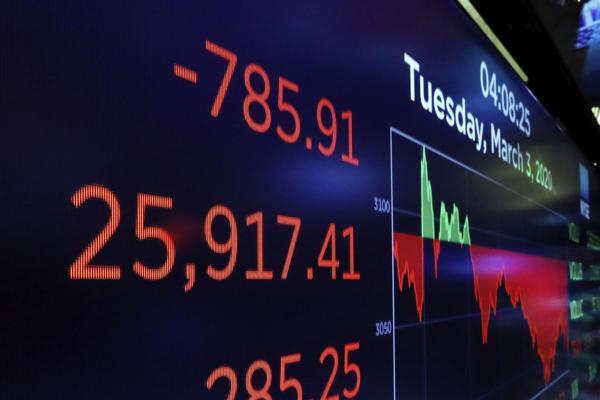Fed slashes rates in emergency response to coronavirus
WASHINGTON


A board above the trading floor of the New York Stock Exchange shows the closing number for the Dow Jones Industrial Average, on March 3, 2020. (AP Photo)
In a bid to counter the adverse effects of the coronavirus outbreak on the world economy, the U.S. Federal Reserve has cut interest rates in an emergency move to try to prevent a global recession, and finance officials from the G7 group of rich countries said they were ready to adopt fiscal and monetary measures where appropriate.
Fed chair Jerome Powell on March 3 announced a surprise half-point interest rate cut that shrank the Fed’s key rate to a range of just 1 percent to 1.25 percent. It marked the first time the central bank has cut rates between scheduled policy meetings since the 2008 financial crisis. And it’s the steepest rate cut the Fed has made since then.
“The virus and the measures that are being taken to contain it will surely weigh on economic activity, both here and abroad, for some time,” Powell said in a news conference.
Fed’s surprise 50 basis point cut came with commentary highlighting the limits of monetary policy, and Wall Street indexes fell sharply. Gold surged and the dollar sank.
The yield on benchmark 10-year U.S. Treasuries, which falls when prices rise, hit a once-unimaginable low of 0.9060 percent.
“The U.S. Federal Reserve’s attempt to surprise the market may have misfired,” said Kerry Craig, strategist at J.P. Morgan Asset Management in Melbourne.
“While the action was intended to steady market confidence, the sharpness of their reaction and the off-schedule timing of the move could be interpreted as the Fed being much more concerned about the economic impact than first thought.”
U.S. President Donald Trump complained that Powell gave “a very bad signal” during his news conference when, according to the president’s interpretation, he “hinted they’re not going to do more.”
In fact, many economists expect the Fed to cut rates at least twice more, at its next meetings in March and April.
Meanwhile, the countries of the G7 bloc are ready to take measures to stem the coronavirus outbreak’s potential effects on the global economy, the U.S. Treasury said on March 3.
The statement came out of a teleconference of finance ministers and central bank governors of the G7 countries – Canada, France, Germany, Italy, Japan, the U.K., and U.S. – to discuss the outbreak.
The G7 countries are determined “to use all appropriate policy tools to achieve strong, sustainable growth and safeguard against downside risks,” said the U.S. Treasury.
However, the statement stopped short of calling for new government spending or coordinated central bank interest rate cuts.
